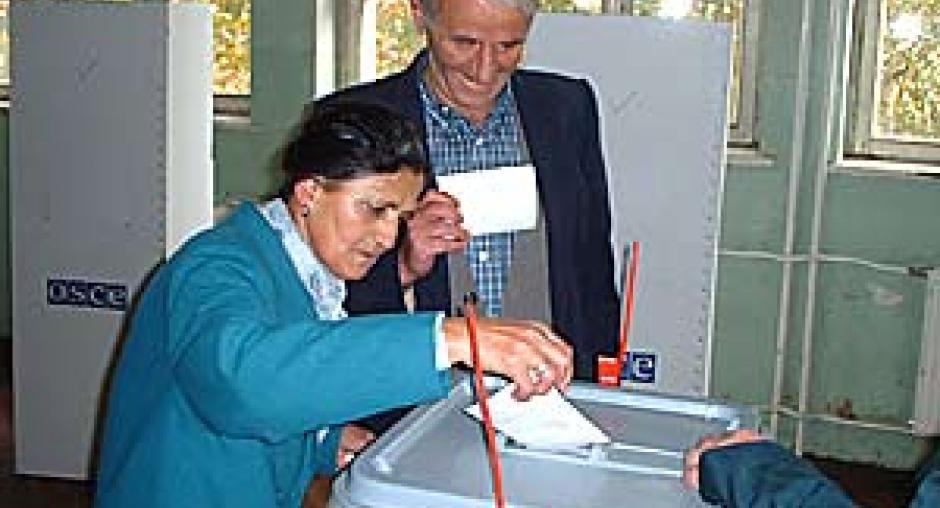Newsroom
OSCE Chairman says economic development essential for political progress in Kosovo
NEW YORK 20 September 2004

Through its largest mission, the 55-nation OSCE works on issues such as human rights, free and fair elections, police training and media development in Kosovo. (OSCE) Photo details
NEW YORK, 20 September 2004 -The OSCE Chairman-in-Office, Bulgarian Foreign Minister Solomon Passy, called on Monday for a major programme of infrastructure investment in Kosovo and throughout the Balkans, saying this was essential for future political stability in the region.
"Developing the infrastructure and political stability have to go together," he told a high-level conference on Kosovo at United Nations headquarters in New York.
"The people of the region are isolated from each other and from the rest of the region. It can take longer to fly from Sofia to Tirana than to cross the Atlantic. There is a desperate need for highways, railways and infrastructure corridors to bring the people of the region closer together."
The Chairman-in-Office said Bulgaria knew from its own experience how important it was for people in south-eastern Europe to have the prospect of full integration into mainstream European political and economic structures. "This provides encouragement by giving people targets to aim at," he added.
Minister Passy said the 55-nation OSCE, which is part of the UN-led administration in Kosovo, remained committed to building a multi-ethnic society in the province.
"Much has been achieved in Kosovo in the past five years but the March violence shows much work remains and significant challenges lie ahead," he told the meeting, attended by sernior officials from the UN, the OSCE, the European Commission, the European Council and NATO.
"We are keen to see progress in the areas of security, rule of law, freedom of movement and returns," Minister Passy added. "We intend to continue to play a major role in assisting in these areas." The OSCE Chairmanship was also willing to consider an enhanced role for the Organization in Kosovo in areas such as capacity-building and policing.
The Chairman-in-Office appealed to all the people of Kosovo, including the minority Serbian population, to participate fully in next month's elections.
"Developing the infrastructure and political stability have to go together," he told a high-level conference on Kosovo at United Nations headquarters in New York.
"The people of the region are isolated from each other and from the rest of the region. It can take longer to fly from Sofia to Tirana than to cross the Atlantic. There is a desperate need for highways, railways and infrastructure corridors to bring the people of the region closer together."
The Chairman-in-Office said Bulgaria knew from its own experience how important it was for people in south-eastern Europe to have the prospect of full integration into mainstream European political and economic structures. "This provides encouragement by giving people targets to aim at," he added.
Minister Passy said the 55-nation OSCE, which is part of the UN-led administration in Kosovo, remained committed to building a multi-ethnic society in the province.
"Much has been achieved in Kosovo in the past five years but the March violence shows much work remains and significant challenges lie ahead," he told the meeting, attended by sernior officials from the UN, the OSCE, the European Commission, the European Council and NATO.
"We are keen to see progress in the areas of security, rule of law, freedom of movement and returns," Minister Passy added. "We intend to continue to play a major role in assisting in these areas." The OSCE Chairmanship was also willing to consider an enhanced role for the Organization in Kosovo in areas such as capacity-building and policing.
The Chairman-in-Office appealed to all the people of Kosovo, including the minority Serbian population, to participate fully in next month's elections.
